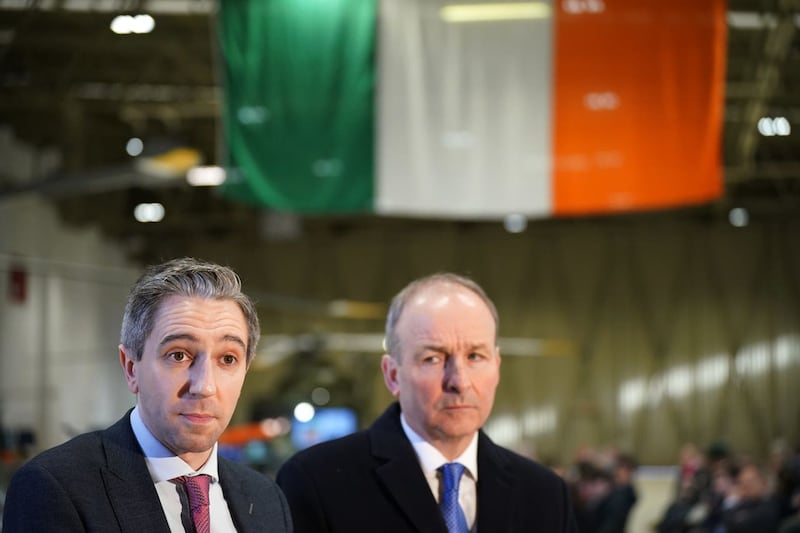Barring a thunderbolt striking the Dáil on Tuesday, 37-year old Simon Harris will become the youngest taoiseach since, well, Leo Varadkar.
Currently he’s preoccupied with two necessary preliminaries. First, trying to secure the support of as many independent TDs as possible. There are 19 and the coalition has a small majority without them, but it’s good to have as many on side as possible. They’re useful in confidence votes when coalition TDs, particularly Greens, decide to make a point.
Secondly, Harris has to decide on cabinet positions. These are strictly limited since his coalition partners have guaranteed places.
Simon Coveney’s departure has helped by giving Harris two places to fill – his own and Coveney’s. Still, it’s tricky because there are geographical considerations: there’s a shortage of ministers in Connacht, and when Coveney goes, in Munster. All that business will be done and dusted by Tuesday, though the after-taste of resentments can linger for months.

Those are tasks any taoiseach has to deal with. They’re straightforward compared to Harris’s main challenge: to make Fine Gael electable again.
The party has been in power for 13 years, since Fianna Fáil imploded in 2011 after the financial crash. Polls show overwhelmingly that voters want change. They tried to reject Fine Gael in 2020 when the party came third behind Sinn Féin and Fianna Fáil. Since then Sinn Féin has consistently outpolled both FF and Fine Gael.
Politico’s poll of polls last month had Sinn Féin on 28% to Fine Gael’s 20%. Results in council and Euro elections in June will be a barometer. So how does Harris head off a revolt by the electorate?
- Harris may soon have all the responsibility and none of the authority – Ursula SavageOpens in new window
- Analysis: Simon Harris needs to be more than merely ‘Continuity Leo Varadkar’Opens in new window
- TikTok Taoiseach Simon Harris should quickly set out his views on unity and border poll - The Irish News viewOpens in new window
Critics in Fianna Fáil complain bitterly that Micheál Martin’s decision to go into coalition with FG damaged the party’s identity and that Martin’s apostasy on its republican tradition has made that worse. However, exactly the same criticism comes from FG members who believe their party’s centre-right Christian Democrat identity has been lost. In both parties it’s tacitly accepted that the only policy they have in common is to keep Sinn Féin out of government.
Varadkar’s departure last month was an admission that he had no answer to Fine Gael’s problems. He had run out of ideas. Ominously for Harris, it appears the party’s other ‘big beasts’ like Paschal Donohoe have no idea either, so they gave Harris a free run.

The biggest problem Fine Gael faces is that the party’s policies over the past 13 years have lost the support of their traditional base – farmers and the conservative middle class.
Farmers blame Fine Gael for caving in to Green policies to reduce carbon, particularly a reduction of livestock numbers and a ban on turf cutting. Admittedly only 4% of the workforce are employed in agriculture but, in rural constituencies, that 4% are increasingly turning away from FG to vote for independents.
Worst of all is the mess Fine Gael has made of housing, which is unaffordable in the greater Dublin area. Not only can young professionals not afford a house, but they now can’t afford rent either. Teachers are commuting for 90 minutes each morning and afternoon to work in Dublin. A diminishing minority of voters under 35 now support Fine Gael.
The biggest problem Fine Gael faces is that the party’s policies over the past 13 years have lost the support of their traditional base – farmers and the conservative middle class
You might notice in all this that there’s no mention of the north. That’s because as far as Harris is concerned, the north has nothing to do with his main priority, the survival of Fine Gael.
Harris has made a couple of speeches in his capacity as Higher Education Minister about greater cooperation between north and south in education, but essentially he is a 26-county politician. For him the north is a foreign country; they do things differently there.

It will be instructive to hear what he has to say in his first address as Fine Gael leader at his party’s ard fheis in Galway tomorrow. Will he present ideas for the renewal of Fine Gael that eluded Varadkar? Will he announce new policies to attract voters who’ve given up on the party? Will he make even a cursory, obligatory nod to reunification?
If he does, it’ll be no more than a sentence, a true reflection of where the north sits on his ‘to do’ list.




